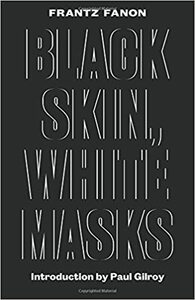Take a photo of a barcode or cover
Este es un libro muy valioso no solo para personas de color pero para cualquiera que sea parte de una sociedad colonial. Definitivamente no es un libro fácil de entender o accesible, habla en términos muy abstractos a veces pero igual diría que es algo que vale la pena leer y estudiar. Definitivamente se une a esos libros que me van a dejar una marca para siempre
challenging
informative
reflective
sad
medium-paced
Fanon was way ahead of his time.
Though reading this felt like going down a theoretical wormhole, I feel that many of Fanon's revelations are still relevant and ongoing today. Examining Sartre's work was brilliant - but I think my favourite chapter to read was the first. I thought it was so interesting to read and ponder about how our perception of people changes not only on the basis of race, but ethnicity as well. You always see Americans (and Canadians, we are definitely guilty of racism as well) speaking loudly and slowly to people they perceive to be immigrants, which Fanon claims is the result of the psychology of colonialism, wherein this way of speaking is to assert positions of dominance and inferiority.
One thing that strikes me about this work from Fanon is that it is largely reminiscent of Du Bois's The World and Africa, where both authors refuse to give the "shit sandwich" and instead just say, "y'all fucked up, and here's why". The blatant rejection of dominant discourse laced with a calling for Black liberation is the recipe for this book, alongside anger and frustration, of course. Fanon's rage and frustration is obvious, but I felt it was a bit watered down when compared to Wretched of the Earth. That may just be me though.
One thing I do want to criticize, however, is Fanon's chapter on the Black woman and the white man, where he argues that Black women are concerned with whitening their racial lineage, but I think Fanon takes on quite a limited perspective here, especially compared to the rest of the book. He fails to consider the extra pressures on women (that is - the intersectional position of being both Black and a woman), especially with regard to beauty standards and expectations. Fanon fails to see that women's worth is inextricably tied to their looks and beauty. By failing to contextualize this in a broader social lens, he comes across as misogynistic and also debases the Black woman's intelligence by reducing her to a single stereotype. So that was quite disappointing to read.
That being said, Fanon really hits the nail on the head when he says that:
This is so ridiculously ahead of his time, as people are still having debates about this and - for the sake of not getting into another ridiculous fight on Goodreads about Zionism vs. Judaism (and anti-Zionism vs. anti-Semitism) that results in me getting blocked, I'll just leave the quote (and the review) at that. Lots of great stuff. Now I'm even more excited for Coulthard's rendition.
Though reading this felt like going down a theoretical wormhole, I feel that many of Fanon's revelations are still relevant and ongoing today. Examining Sartre's work was brilliant - but I think my favourite chapter to read was the first. I thought it was so interesting to read and ponder about how our perception of people changes not only on the basis of race, but ethnicity as well. You always see Americans (and Canadians, we are definitely guilty of racism as well) speaking loudly and slowly to people they perceive to be immigrants, which Fanon claims is the result of the psychology of colonialism, wherein this way of speaking is to assert positions of dominance and inferiority.
One thing that strikes me about this work from Fanon is that it is largely reminiscent of Du Bois's The World and Africa, where both authors refuse to give the "shit sandwich" and instead just say, "y'all fucked up, and here's why". The blatant rejection of dominant discourse laced with a calling for Black liberation is the recipe for this book, alongside anger and frustration, of course. Fanon's rage and frustration is obvious, but I felt it was a bit watered down when compared to Wretched of the Earth. That may just be me though.
One thing I do want to criticize, however, is Fanon's chapter on the Black woman and the white man, where he argues that Black women are concerned with whitening their racial lineage, but I think Fanon takes on quite a limited perspective here, especially compared to the rest of the book. He fails to consider the extra pressures on women (that is - the intersectional position of being both Black and a woman), especially with regard to beauty standards and expectations. Fanon fails to see that women's worth is inextricably tied to their looks and beauty. By failing to contextualize this in a broader social lens, he comes across as misogynistic and also debases the Black woman's intelligence by reducing her to a single stereotype. So that was quite disappointing to read.
That being said, Fanon really hits the nail on the head when he says that:
The Jewishness of the Jew, however, can go unnoticed. He is not integrally what he is. We can but hope and wait. His acts and behavior are the determining factor. He is a white man, and apart from some debatable features, he can pass undetected...[Jews] have been hunted, exterminated, and cremated, but these are just minor episodes in the family history. The Jew is not liked as soon as he has been detected. But with me things take on a new face. I'm not given a second chance. I am overdetermined from the outside. I am a slave not to the "idea" others have of me, but to my appearance.
This is so ridiculously ahead of his time, as people are still having debates about this and - for the sake of not getting into another ridiculous fight on Goodreads about Zionism vs. Judaism (and anti-Zionism vs. anti-Semitism) that results in me getting blocked, I'll just leave the quote (and the review) at that. Lots of great stuff. Now I'm even more excited for Coulthard's rendition.
challenging
inspiring
slow-paced
informative
reflective
tense
slow-paced
Black skin, white mask was initially published over 70 years ago, but unfortunately, it is still relevant. The book mainly centers on the lived experience and psyche of the male Black "Antillean" from Martinique in relation to Whiteness in France and its former and current colonies. I resonated with many aspects of this book as a Black person from the Caribbean (the colorism, texture-ism, and policing of creole and anything deemed "too Black" is real, y'all), a psychologist who practices psychodynamically (I enjoyed his critique that Jung's collective unconscious is a socially/culturally acquired phenomenon rather than an innate individual one), and an immigrant in a white imperial state (I am Black first and only in the eyes of Whiteness). There are many great points and insights to reflect on and digest.
I had two big upsets with this book. One is misogyny, and especially misogynoir. Fanon had more to say about white women than Black women. The analysis of Black women felt one dimension and brief, despite dedicating an entire chapter to them. While he applied the sociopolitical context to his analysis of Black men, he seemed to have lost it when discussing Black women. Not to mention, he missed the analysis of the unique position of Black women due to their gendered, class, and racial realities. I found this oversight perplexing, dismissive, and disappointing, to say the least. I'll let this quote speak for itself. "Those who grant us our findings on the psychosexuality of the white woman may well ask us what we have to say about the Black woman. We know nothing of her."... What do you mean you don't know her!? Didn't you have a mother and sisters? That's wild.
Two, alongside the misogynoir, homophobia made an appearance. As usual, it was casually presented as fact, yet it was completely unnecessary and added little, if anything, to the analysis. It came from left field, unprovoked, unneeded, and was shocking every time it reared its head. But, I guess, what would a book published in the 50s be without it!?...
Nonetheless, the book has value.
I had two big upsets with this book. One is misogyny, and especially misogynoir. Fanon had more to say about white women than Black women. The analysis of Black women felt one dimension and brief, despite dedicating an entire chapter to them. While he applied the sociopolitical context to his analysis of Black men, he seemed to have lost it when discussing Black women. Not to mention, he missed the analysis of the unique position of Black women due to their gendered, class, and racial realities. I found this oversight perplexing, dismissive, and disappointing, to say the least. I'll let this quote speak for itself. "Those who grant us our findings on the psychosexuality of the white woman may well ask us what we have to say about the Black woman. We know nothing of her."... What do you mean you don't know her!? Didn't you have a mother and sisters? That's wild.
Two, alongside the misogynoir, homophobia made an appearance. As usual, it was casually presented as fact, yet it was completely unnecessary and added little, if anything, to the analysis. It came from left field, unprovoked, unneeded, and was shocking every time it reared its head. But, I guess, what would a book published in the 50s be without it!?...
Nonetheless, the book has value.
i had to read this for a black critical theory class and… there were some really good parts but every time fanon spoke about women I disagreed with everything he said. he is a misogynist. also my professor didn’t really want to talk about that, every time it was brought up he’d change the subject
You can't have good racial politics if you don't have good gender politics. I give this the slightest of passes for its attempt to grapple with colonialism and also being written in the 1950s. Also Fanon was actually on the front line fighting against white supremacy (fought for Algerian National Front), so I have to gve him some respect.
challenging
emotional
informative
reflective
sad
tense
slow-paced
challenging
slow-paced
I found this to be refreshingly challenging, not just in how it was a slow read, but also how it challenged me intellectually! Lots of chew on with this.







